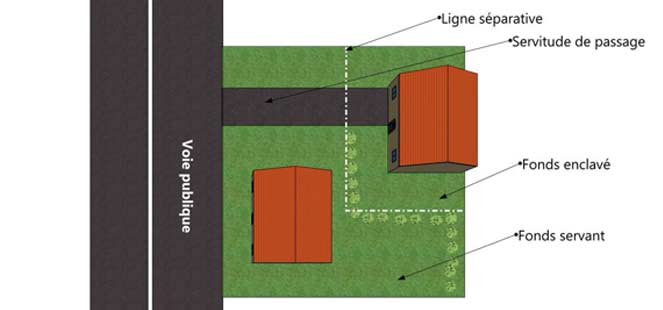How can a “servitude” be established?

A servitude is defined as a charge imposed on an immovable (the servient land), in favor of another immovable (the dominant land), which belongs to a different owner (article 1177 of the Civil Code of Québec).
For example, certain public services (electricity, gas, telephone) benefit from a servitude to partially use your property in order to pass aerial or underground wires, or to circulate with equipment for network maintenance. A servitude can also allow the owner of landlocked land to pass over the land of their neighbour to reach their own land.
How to establish a servitude
A servitude can be established in 4 ways:
Conventional servitude
The conventional servitude is divided into two parts:
i) The real servitude: this is a charge imposed on an immovable, in favor of another immovable. Two properties are therefore required: the servient land (which renders a service by granting the servitude) and the dominant land (which receives the service and therefore benefits from the servitude). The charge therefore follows the buildings, regardless of the change of owner, and may be perpetual.
ii) Personal servitude: this is a charge (real right) imposed on tangible property in favor of a natural person (as opposed to an immovable). This type of servitude does not apply exclusively to immovables and may also concern movable property. The charge therefore exists only in favor of the person(s) designated in the deed and is therefore limited in time.
Servitude by destination of the owner
This servitude is evidenced in writing by the owner of the land who, planning to subdivide his or her land, immediately establishes the nature, extent, and location of the servitude over part of the land in favor of other parts. The servitude will only exist at the time of alienation, i.e., when the land becomes part of separate heritages.
Testamentary servitude
A servitude can be established by will. The testator may assign a right of usufruct or use to his property or attach a servitude to an immovable forming part of his patrimony. In the latter case, there is a double bequest: the servient land and the servitude.
Legal servitude
A servitude may be established by law, i.e., by a provision of a given statute. For example, the owner of a landlocked property has the right to pass over his neighbor’s land to access his own land (article 997 et seq. C.c.Q.), a servitude for water drainage (article 979 C.c.Q.), services established by law for public utilities (electricity, gas, and telephone).
Don’t hesitate to contact us if you have any questions about servitudes. In some circumstances, court intervention may be necessary to obtain, extinguish or clarify the terms of a servitude, but often, opening a dialogue with the opposing party and/or serving a formal notice can resolve the situation.